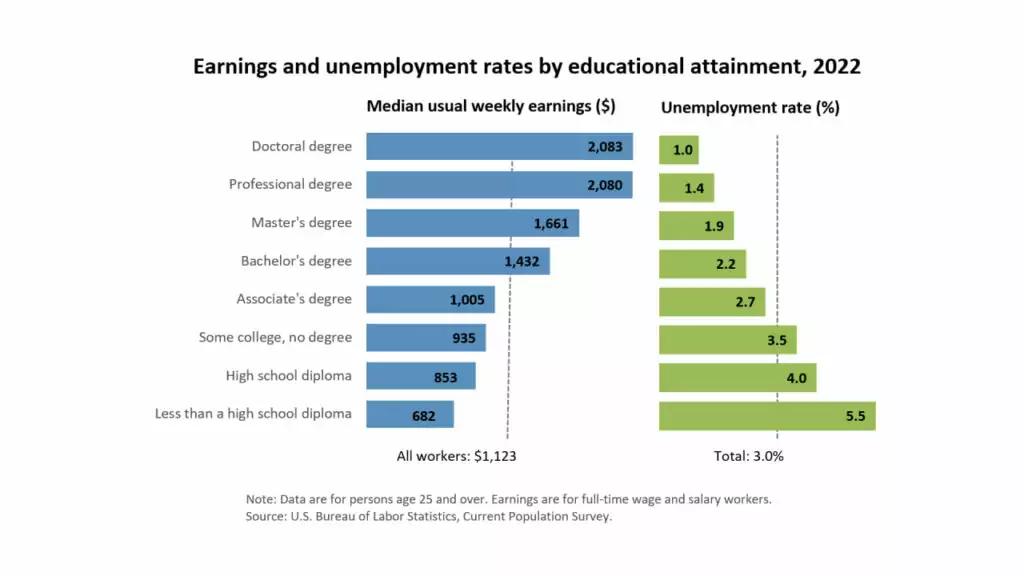The decision to pursue a PhD often comes with mixed feedback. While many emphasize the challenges like financial strain and long hours, there are also unsung benefits to consider. This article offers an in-depth look, presenting both the pros and cons, to provide a comprehensive understanding for those contemplating this academic path.

✅ AI Essay Writer ✅ AI Detector ✅ Plagchecker ✅ Paraphraser
✅ Summarizer ✅ Citation Generator
Key Takeaways:
- PhD programs offer unparalleled schedule flexibility, allowing a work-life balance.
- Post-PhD career opportunities can be financially rewarding, especially in specific fields.
- Hands-on volunteering enriches your academic journey, offering practical experience before formal PhD work begins.
Many people online, especially on Reddit, talk about the tough parts of being a PhD student. But there’s a positive side too. This article will talk about the good things: getting paid to learn, working with smart folks, and sharing your ideas with the world. Let’s look at the brighter side of the PhD journey.
Benefits of Being a PhD
When many people hear the term “PhD”, they might immediately think of endless research, long hours, and a challenging journey. But, if we dive into personal experiences, a fuller, more nuanced picture emerges. Several PhD students and graduates took to Reddit to share the advantages they found in their academic pursuits, revealing a side to the journey that’s often overshadowed by its challenges.
One of the standout benefits is the considerable flexibility that a PhD program offers. Unlike rigid 9-5 jobs, many students have the liberty to tailor their schedules. One Reddit user contributes,
“This might not apply to all – but I really took for granted how flexible I could make my work schedule.”
They further elaborated on how they had control over their time. If a friend wanted to hang out on a Friday or if they wanted to plan a holiday, they often could without much restriction. Another user chimed in, noting the unmatched flexibility of their hours in a computational field. When life events such as pregnancy came up, the flexibility in their schedule made it easier to manage. They could sleep in when they felt ill or attend necessary medical appointments without facing repercussions.
Contrasting the PhD lifestyle with demanding industry roles, a seasoned PhD on Reddit shared their insights,
“I was in a computational field and I had complete ownership over my hours. I know a lot of people say that a PhD has a huge workload, but I didn’t see anyone in my cohort pulling such long days despite it being a top program.”
Before their PhD, they worked as an investment banker, often running on just four hours of sleep, leaving the office sometimes at 6 am only to be back by 8:30 am.
Besides flexibility, the nature of work and learning opportunities that come with pursuing a PhD also seem to resonate positively with many. As one individual put it,
“I’m in a field where there’s a strong market for PhDs in industry. It’s the best of both worlds.”
They highlighted that the kind of work they now engage in after their PhD is more interesting than what they had been doing before.
Another Reddit user was passionate about their niche research area, stating,
“I’m doing philosophical analysis of psychedelics and I get to research basically whatever I please.”
They found great value in the support of open-minded supervisors and a rich network of fellow researchers, making their PhD journey feel meaningful. They also mentioned their success in publishing an article, showcasing that academic accomplishments can bring a great sense of pride and achievement.
Furthermore, many PhD students find unique opportunities to leverage student benefits, even when they’re deep into their program. As one individual humorously pointed out,
“Abusing student privileges (i.e. access to certain spaces, groups, discounts) that are probably meant mostly for undergrads but hey why shouldn’t I show up for the therapy dogs during finals week at the library?”
These perks, though seemingly minor, can enhance the overall student experience.
The financial side of things was also touched upon. A prevailing myth suggests that all PhD students struggle financially. While it’s true that many aren’t rolling in money, the picture isn’t universally bleak. One individual shared,
“I can’t complain with a comfortable six-figure income,” after finishing their PhD, implying that certain fields do offer lucrative opportunities post-graduation. Another user from Finland mentioned they had secured 1.5 years of funding for their research, underscoring that, while not wealthy, they were “doing financially OK.”
In the US, people with a PhD usually earn more and face lower unemployment than those without one. But this isn’t a rule for everyone. If you’re mainly looking to make money, starting a job right after university can often be the better move. During the years spent on a PhD, you could already be building job experience and moving up in your career. So, while a PhD might pay off for some, it’s essential to think about other job options and their earnings too.

The overarching sentiment from these insights is that while there are undeniable challenges in pursuing a PhD, there’s also a wealth of benefits that often go unnoticed. From flexibility to learning opportunities, from financial stability in certain fields to the joy of academic achievements, the journey can be incredibly rewarding. As one Reddit user aptly summarized,
“Honestly, the lifestyle (save for the low pay) is extremely good in many fields. Overall, not too shabby. I don’t regret it.”
How to Prepare for a PhD Program
Preparing for a PhD program might seem daunting, but with the right steps, you can be well-prepared for this significant chapter in your academic journey. Here are three straightforward tips to help you get ready for a PhD program, based on insights and experiences shared by those who have walked this path.
1. Understand What’s Expected in a PhD Program
Before you dive into a PhD, it’s essential to know what you’re getting into. This means understanding the requirements of the program. Most PhD programs will want you to have a master’s degree in a related field. Some might even ask for added coursework or some research experience. So, before you start filling out that application form, check out the program’s admission requirements. Make sure you tick all the boxes.
But it’s not just about meeting the entry criteria. It’s also about understanding what the program involves. What kind of academic work will you need to do? What sort of research projects might you take on? By getting a clear picture of these things, you’ll be better prepared to tackle the program head-on.
2. Choose the Right Program for You
Picking the right PhD program can make a world of difference. It’s all about finding a program that matches your research interests and goals. To do this, take a close look at the faculty in the program. What are they researching? If you can find professors or mentors whose interests align with yours, you’re on the right track.
Also, think about the resources the program offers. Are there good facilities, labs, and tools available? What about funding? Some programs might offer scholarships, grants, or fellowships. Remember, a PhD can be pricey, so any financial support can be a big help.
3. Get Practical Experience
While university courses often teach you a lot of theory, getting hands-on, practical experience can give you an edge. One great way to do this is by volunteering in a research lab. As one student shared, volunteering gave them a chance to see research in action and feel like they were making a real contribution, even before starting their PhD.

Volunteering also lets you try out different research areas. You might find a topic you’re passionate about or figure out that something you thought you’d love isn’t really for you. And the good news? These volunteer stints usually aren’t long-term commitments. So, you can try a few different things without feeling stuck.
Another bonus of volunteering is the skills you pick up. Maybe you’ll learn how to use a specific piece of research equipment or get to know a particular kind of data analysis. These skills can come in handy when you start your PhD. And, if you’re looking to boost your resume, this experience can be a gold star when applying for paid positions or graduate programs.
If you’re wondering where to find these opportunities, start with online platforms like Facebook groups or job sites. Some universities post opportunities on notice boards. But one of the best ways? Reach out to faculty members or staff at your university. They often know about opportunities that aren’t widely advertised and can point you in the right direction.
Pursuing a PhD comes with challenges, but it’s also packed with rewards. Understanding the full spectrum can guide informed decisions for aspiring academics.
Follow us on Reddit for more insights and updates.





Comments (0)
Welcome to A*Help comments!
We’re all about debate and discussion at A*Help.
We value the diverse opinions of users, so you may find points of view that you don’t agree with. And that’s cool. However, there are certain things we’re not OK with: attempts to manipulate our data in any way, for example, or the posting of discriminative, offensive, hateful, or disparaging material.